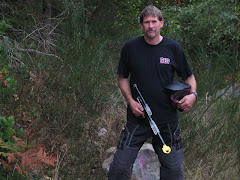Today was an odd day at our field. It was the first day of our 2 for 1
Wednesdays, we are hosting every Wednesday during July & August. It came just two days after a big sale we had
this past long weekend (It was Canada Day July 1, so virtually the whole country
had Monday off as well), so we had a feeling it would be a slow day.
We were right. Only
15 people showed up, not one of them renting.
That’s very unusual for our field, although the gear owner numbers
having been increasing over the years, with a smaller percentage of our
customers renting (the number of renters is not decreasing, just the
percentage). I’m not overly concerned
about the small numbers and the fact that we lost money today. We’ll make up for it on other days. That’s just the way it works in business
sometimes.
I did not actually work today as I had overseen Monday’s and
Tuesday’s games, so it was my business partner’s turn today. But I did take a look at the pictures that he
posted to our Facebook page tonight. You can see them here: https://www.facebook.com/media/set/?set=a.411769118858710.79310.160099750692316&type=1 What
stood out for me was the number of pumps the gear owners were using and how
many of the gear owners that weren’t using pumps, were using 50 round hoppers,
with no visible pod packs carried. Yeah,
there were two or three players there with 200 round hoppers and look like they
had pod packs as well, but the vast majority didn’t.
It makes me proud to know that with our policies we have
created a field where most people choose to shoot lower volumes. We have no rate of fire restrictions other
than no full auto or ramping. We don’t
limit the amount of paint players can carry on the field (except our refs who
are not allowed to carry pods of extra paint as they get paint at a discount
and it would not be fair to others who do not get the discounted price). But people choose to shoot less
paintballs. People also choose to come
to our field more than any other field on Vancouver Island, by a good margin. It’s not because we are the cheapest. We’re not.
It’s because of the atmosphere.
When own gear players choose to take out only 50 paintballs
in a 15 minute game, you can be reasonably sure they are not going to go hog
wild on other players. It’s rare when
you hear strings of high ROF paintballs during one of our games. I hear it when I play at other fields all the
time, but at our field, I only hear it occasionally and only for short
durations. Because of that, our
customers tend to have fun, on any given day, even on days when there are no
renters around.

